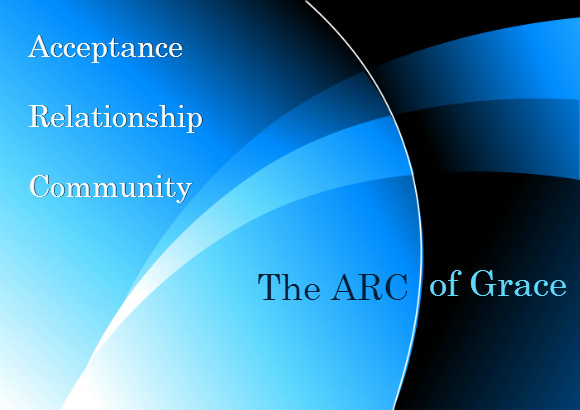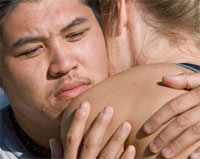Isolated. Alone. Forbidden. Labeled. Diseased. Terminal. Forsaken. Forgotten. Desperate.
For a variety of skin conditions thought to possibly be leprosy, the Torah had clear instructions. These instructions were for the safety of the many — especially the community and the family. For the one with this disease, life was nearly unbearable if a cure wasn't quickly found and restoration to normal life wasn't quickly accomplished. Living outside the city gates, wearing clothing (rags of desperation) showing they were diseased and outcast, crying out their warning to others who came nearby, life was barely human (Leviticus 13:1-46). This, then, is the background of our story told by Mark:
Jesus:It's time we went somewhere else — the next village, maybe — so I can tell more people the good news about the kingdom of God. After all, that's the reason I'm here.So He traveled to the next village and the one after that, throughout the region of Galilee, teaching in the synagogues and casting out unclean spirits.
A leper walked right up to Jesus, dropped to his knees, and begged Him for help.
Leper:
If You want to, You can make me clean.Jesus was powerfully moved. He reached out and actually touched the leper.
Jesus:
I do want to. Be clean.And at that very moment, the disease left him; the leper was cleansed and made whole once again.
Jesus sent him away, but first He warned him strongly.
Jesus:
Don't tell anybody how this happened. Just go and show yourself to the priest so that he can certify you're clean. Perform the ceremony prescribed by Moses as proof of your cleansing, and then you may return home.(Mark 1:37-44 The Voice)
Grace is what happens in this story. Grace is what Jesus gives this man.
Grace!
We talk about it freely. We depend upon it completely. We love to believe we've received it. And, I fear much like Jesus' brother Jude warned (Jude 1:4), we have abused and distorted it frequently.
So I wonder, have we taught much about how Jesus shared grace frequently and calls on us to do the same?
Over the last few years as I have immersed myself in the story of Jesus in the gospels — Matthew, Mark, Luke, and John — I've noticed a pattern repeating itself in the interactions of Jesus with people he helps. I like to call this the ARC of grace:
- Acceptance
- Relationship
- Community
Jesus has a mission to accomplish and he has set out on this mission (Mark 1:35-39). Yet this man with leprosy approaches Jesus as he walks along the road — something the man is forbidden by the Torah to do.
The ARC of grace begins with acceptance. Jesus sees the man, hears his cry, knows from his garments what his desperate condition is and Jesus accepts the man right where he is and as he is. Jesus had every right — maybe even a social obligation — to keep on moving past the man and stick with his mission agenda. Yet the Lord paused and fully accepted the man into his presence and heard his request. Notice that Jesus directly responds to the man's request:
"If you want to, you can make me clean.""I do want to..." (Mark 1:40-41).
Jesus didn't give the man platitudes. The Lord didn't avoid the conversation. The Teacher didn't give him a lesson on the requirements of the Torah. The Son of Man didn't throw him some money and keep moving on his way, keeping a safe distance. Jesus listened to the man's request and validated that request with the words and actions of his response. Jesus gave this man afflicted with leprosy grace — the grace of acceptance.
Yet the ARC of grace doesn't end with verbal, social, and physical acceptance. Gracious acceptance leads to relationship — personal relationship. Before Jesus heals the man with his verbal command, Jesus does the most humanizing thing possible in this moment. "Jesus was powerfully moved. He reached out and actually touched the leper" (Mark 1:41). Jesus shares this man's uncleanness and enters into a deep, personal, relationship of grace.
While it is hard for us to imagine the depth of this move from Jesus, I have seen it demonstrated. More than twenty years ago, when AIDS was deeply feared, drugs were just being tried to combat HIV, and the few hospitals that really treated AIDS patients kept them in dedicated wards for AIDS patients. Visitors were few and fear was high. There was a young man in his twenties in the last stages of the disease. The young man had long before expressed deep regret for his IV drug use that led to his infection and turned his life around. He had been reading the Bible again and taking communion each week with one of the men at church who had said this young man desperately needed a visit from church leaders.
This young man had lesions all over his frail stick of a body. His breathing, even in the oxygen tent, was heavily labored. Human touch was forbidden. I went there with an elder in my church who was immunosuppressed and should have been the last person to do what he did. Yet as we offered this young man communion and prayer, this elder unzipped the tent, gave this young man the Body and Blood of Jesus, called him brother, placed his hands on this young man's chest and prayed over him to know that his church family and his Father in heaven loved him. Tears flowed. Grace made sure relationship was experienced. The words of the prayer were powerful, but the young man said that what meant most was that this was the first skin to skin contact he had received from anyone but a nurse in months. This young man lived less than two more weeks. Yet in his dying days, he knew he had relationship with a family that loved him and a Father that was waiting for him because the ARC of grace includes genuine relationship.
The importance of Jesus' final action is nearly always missed when I hear this story discussed. Jesus tells the man to go show himself to the priest (Mark 1:44). Why? So Jesus can have some proof to share with the priests who were often critical of him? No! Jesus wanted the man restored fully back into the life of community. The Torah required the priest to pronounce him healed so that he could return to normal life, to family, to work, to friendships, and to worship. Grace is not full until it brings us back into genuine community.

I encourage you to look at the ministry of Jesus and you will see this pattern — this ARC of grace — repeated again and again. Acceptance, relationship, and community make grace real, full, and life-giving.
As we look at what grace means to us and as we look at how we offer grace to others, let's have Jesus be our model! If we claim to be his followers, if we take the bread and remember the body and are "re-membered" into the body of Jesus, let's take seriously the ARC of grace. We all need, and we all need to offer, acceptance, relationship, and community. Anything less lessens grace of its goodness, redemption, and life!










Reader Comments
Archived Facebook Comments